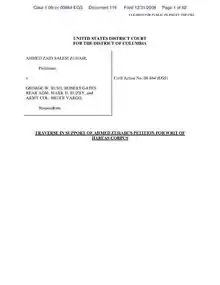Ahmed Zaid Salim Zuhair
Ahmed Zaid Salim Zuhair is a citizen of Saudi Arabia formerly held in extrajudicial detention in the United States's Guantanamo Bay detention camps, in Cuba.[1]
| Ahmed Zaid Salim Zuhair | |
|---|---|
| Born | 1965 (age 55–56) Jeddah, Saudi Arabia |
| Released | 2009-06-12 Saudi Arabia |
| Citizenship | Saudi Arabia |
| Detained at | Guantanamo |
| ISN | 669 |
| Status | Repatriated |
On August 13, 2008, it was reported that Ahmed Zaid Zuhair had been on a hunger strike since June 2005.[2] Two other long-term hunger strikers died under mysterious circumstances in June 2006.
On March 18, 2009, camp authorities declined to agree to moving Zuhair to Camp 4 from Camp 6 in return for his ending his hunger strike.[3]
In December 2008, an Administrative Review Board cleared Zuhair for release from Guantanamo. On May 22, 2009, Zuhair was cleared for transfer once again by the Inter-Agency Review process established by President Obama. He was repatriated to Saudi Arabia on June 12, 2009.
Habeas corpus petition
Carol Rosenberg, writing in the Miami Herald, reported that Zuhair's June 12, 2009, repatriation came shortly before the Department of Justice would be called upon to defend his continued detention during consideration of his habeas corpus petition.[4]
Zuhair's lawyers have filed an extensive refutation of the government's allegations in court. They argue that the allegations against Zuhair are baseless:
The Government rests its case against Mr. Zuhair mainly upon two types of evidence: raw intelligence that lacks any indicia of reliability and statements extracted under torture that are not only inherently unreliable but so repugnant to Constitutional protections of dignity and fairness as to require them to be struck. As a matter of law, this Court can accord neither sort of evidence any persuasive weight.[5]
Zuhair's lawyers point out that the type of intelligence document extensively relied upon to justify his detention almost always carry the legend "WARNING: INFORMATION REPORT, NOT FINALLY EVALUATED INTELLIGENCE" and are used to circulate possible leads, rather than verified information.[5]
Although most of the tortured-based evidence in the case remained classified, Zuhair's attorneys also produced an unclassified declaration from Sa'd Iqbal Madani, a victim of rendition and torture in Egypt and Afghanistan. In it, Madani described how, in order to avoid further mistreatment, he made false statements at Bagram that interrogators used to link Zuhair to the Cole bombing.[6] Other detainees who were held at Bagram, including Mamdouh Habib[7] and Moazzam Begg,[8] also attested to the torture that Madani experienced.
Zuhair's attorneys also attacked the government's allegations directly. Most importantly they demonstrate that despite investigations of the murder of William Jefferson by Bosnian police, the United Nations, and the FBI, Zuhair was never charged as a suspect. Moreover, Bosnian authorities issued an arrest warrant for another man, Fa'iz al-Shanbari, for the murder in 1998. A comprehensive 200-page investigation by the UN did not even mention Zuhair.[5] Zuhair's attorneys conclude:
It has been thirteen years since William Jefferson was murdered, in a country U.S. investigators would have had no problems accessing, and Ahmed Zuhair has spent over half of that time in American custody. Under such circumstances, the lack of an indictment against Mr. Zuhair for this crime from either jurisdiction should speak for itself.[5]
Hunger strike


In May 2008, the Gulf News reported that Zuhair and Abdul Rahman Shalabi are the two remaining captives who have been on the hunger strike that started in August 2005.[9][10]
On October 25, 2008, the Associated Press reported that new documents, documenting Guantanamo guards' struggles to force-feed Zuhair, had recently been filed in court.[11] According to the report:
...according to court documents reviewed by The Associated Press, guards have struggled with him repeatedly, at least once using pepper spray, shackles and brute force to drag him to a restraint chair for his twice-daily dose of a liquid nutrition mix force-fed through his nose.
Joint Task Force Guantanamo guard force commander Colonel Bruce Vargo offering the justification for the use of force, stated:[11]
ISN 669 has a very long history of disciplinary violations and noncompliant, resistant and combative behavior.
According to an affidavit filed by Ramzi Kassem, one of his attorneys, official records document that between August and October Zuhair lost over 16 kilograms, dropping to under 45 kilograms.[12] Kassem's affidavit stated that when he last visited Zuhair, in mid November, he kept vomiting uncontrollably, because he was allergic to the liquid food substitute used during his force-feedings.
Mr. Zuhair lifted his orange shirt and showed me his chest. It was skeletal. Mr. Zuhair's legs looked like bones with skin wrapped tight around them.
Pauline Storum, a Joint Task Force Guantanamo spokesmen, stated that camp authorities monitored the captives' health closely.[12]
US District Court Judge Emmet Sullivan ordered an independent medical examination for Zuhair.[13]
On March 17, 2009, Ben Fox, writing for the Associated Press quoted a court statement filed by Colonel Bruce Vargo, commander of the camp's guard force, who explained that camp authorities could not agree to move Zuhair to the Camp 4, due to his history of infractions of the camp rules.[3] He stated it would set a bad precedent, and that other captives held in camp 6 might follow his example, so that they too could be moved to camp 4.
Vargo's statement acknowledged that the camp's riot squad was routinely called upon to extract Zuhair from his cell for his twice-daily force-feedings.[3] His statement said Zuhair had committed 80 infractions of the camp rules in the last four months.
Vargo stated that Zuhair currently weighed 114 pounds, down from 137 pounds in August 2008.[3]
After his repatriation to Saudi Arabia on June 12, 2009, Carol Rosenberg, writing in the Miami Herald, reported that Zuhair had been the longest lasting hunger striker, whose hunger strike had lasted 1450 days.[4]
Death threats
Zuhair wrote a letter to his attorneys on July 18, 2008, stating that Guantanamo guards had searched his cell, confiscated some of his correspondence with his attorneys, and threatened to kill him if he did not drop his habeas petition.[2][14] Judge Emmet G. Sullivan ordered the guards involved to submit sworn declarations to the court detailing their responses to the allegations, the first time a judge had done so in a Guantanamo-related case.[15]
Repatriation
Zuhair and two other Saudis, Abdelaziz Kareem Salim al-Noofayee and Khalid Saad Mohammed, were repatriated to Saudi Arabia on June 12, 2009.[4][16][17][18]
Fox News reported that Zuhair: "had been implicated in the murder of an American."[19]
Saudi security officials have stated that the three men were allowed to meet with their families, shortly after their repatriation.[20] Security officials said the three men were then taken to an undisclosed location for interrogation. The three men would go through the same Saudi jihadist rehabilitation program as other repatriated captives, even though some former captives have back-slid to supporting jihadism following their release.
Admission of Insufficient Evidence

During a hearing of the Senate Judiciary Committee on June 17, 2009, Attorney General Eric Holder publicly admitted that Zuhair had been cleared for transfer from Guantanamo by both administrations because "there was no sufficient proof to bring a case" against him.[21]
See also
References
- "List of Individuals Detained by the Department of Defense at Guantanamo Bay, Cuba from January 2002 through May 15, 2006" (PDF). United States Department of Defense. Retrieved 2006-05-15.
- "Gitmo hunger striker claims guards threatened him". Miami Herald. 2008-08-13. Archived from the original on August 13, 2008. Retrieved 2008-08-12.
- Ben Fox (2009-03-17). "US rejects deal to end long Gitmo hunger strike". Associated Press. Retrieved 2009-03-18. mirror
-
Carol Rosenberg (2009-06-12). "U.S. sends 3 more detainees to Saudi Arabia". Miami Herald. Archived from the original on 2009-07-29. Retrieved 2009-06-16.
Prison camp staff subjected Zuhair to the detention center's tube-feeding regime, periodically strapping him into a chair across 1,450 days and pumping a nutritional shake through a tube tethered up his nose and into his stomach. Judge Emmett [sic] Sullivan had set a June 30 hearing for Justice Department lawyers to defend his Guantanamo detention.
- "Traverse in Support of Ahmed Zuhair's Petition for Writ of Habeas Corpus". 2008-12-31. Retrieved 2009-06-16.
- "Declaration of Sa'd Iqbal Madani" (PDF). 2008-12-30. Retrieved 2009-06-16.
- "Declaration of Mamdouh Habib" (PDF). 2008-12-29. Retrieved 2009-06-16.
- "Declaration of Moazzam Begg" (PDF). December 2008. Retrieved 2009-06-16.
- "Saudi vows to stay on hunger strike at Guantanamo". Gulf News. 2008-05-23. Archived from the original on 2012-09-26. Retrieved 2008-10-02.
-
"Saudi vows to continue hunger strike". Press TV. 2008-05-23. Archived from the original on 2012-09-18. Retrieved 2009-08-21.
'He looks extremely skinny, just like you would expect someone to look who has been on hunger strike for three years,' said Ramzi Kassem, part of a Yale Law School legal team representing Zuhair, who visited him this month.
- Ben Fox (2008-10-25). "Guantanamo guards struggle with hunger striker". Associated Press. Archived from the original on 2008-10-26. Retrieved 2008-10-26.
- Ben Fox (2008-11-27). "Hunger strike takes toll on Gitmo prisoner". Associated Press. Archived from the original on 2008-11-30. Retrieved 2008-11-28.
- "Medical exam ordered for Guantanamo prisoner". Hamilton Spectator. 2008-12-20. Retrieved 2008-12-20.
- "Guantanamo detainee accuses US guards of threatening to kill and maim him". Thaindian. 2008-09-23. Archived from the original on 15 October 2008. Retrieved 2008-09-26.CS1 maint: bot: original URL status unknown (link)
- Huma Yusuf (2008-09-23). "Detainees' rights subverted at Guantánamo, their lawyers say". The Christian Science Monitor.
- "US 'kept Guantanamo deal from UK'". BBC News. 2009-06-12. Archived from the original on 2009-06-13.
- Abdul Aziz Al-Rubaiee (2009-06-16). "Guantanamo returnee's brother speaks of joy in the family". Saudi Gazette. Archived from the original on 2011-07-16. Retrieved 2009-06-16.
- "Three Saudis Moved From Guantanamo". The Washington Post. 2009-06-13. Archived from the original on 2012-11-08. Retrieved 2009-06-15.
- "U.S. Sends to Saudi Arabia Gitmo Detainee Accused of Killing American". Fox News. 2009-06-12. Archived from the original on 16 June 2009. Retrieved 2009-06-16.
- Abeed al Suhaimy (2009-06-14). "Saudi Arabia in Talks to Secure Return of Final 10 Guantanamo Detainees". Asharq Alawsat. Archived from the original on 2011-07-07. Retrieved 2009-06-16.
- C-SPAN (2009-06-17). "Senate Judiciary Hearing with Eric Holder". pp. 40:45-42:30. Retrieved 2009-06-18.